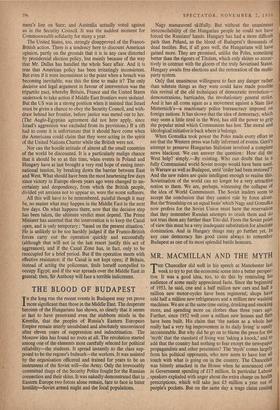THE BLOOD OF BUDAPEST
IN the long run the recent events in Budapest may yet prove more significant than those in the Middle East. The desperate heroism of the Hungarians has shown, so clearly that it seems at last to have penetrated even the stubborn minds in the Kremlin, that the peoples of Russia's Eastern European Empire remain utterly unsubdued and absolutely unconvinced after eleven years of suppression and indoctrination. The Moscow idea has found no roots at all. The revolution started among one of the elements most carefully selected for political reliability—the students. It spread instantly .to the class sup- posed to be the regime's bulwark—the workers. It was assisted by the organisation officered and trained for years to be an instrument of the Soviet will—the Army. Only the irrevocably committed thugs of the Security Police fought for the Russian connection and their skins. It was nakedly demonstrated that in Eastern Europe two forces alone remain, face to face in bitter hostility—Soviet armed might and the local populations. Nagy manoeuvred skilfully. But without the unanimous irreconcilability of the Hungarian people he could not have forced the Russians' hands. Hungary has had a more difficult path than Poland. as the blood of Budapest's thousands of dead testifies. But, if all goes well, the Hungarians will have gained more, They are promised, unlike the Poles, something better than the rigours of Titoism, which only shines so attrac- tively in contrast with the gloom of the truly Sovietised States. Hungary awaits free elections and the restoration of the multi- party system.
Only that unanimous willingness to face any danger rather than tolerate things as they were could have made possible this revival of the old techniques of democratic revolution— demonstrations, barricades, the revolutionary general strike. And it has all come again as a movement against a State like Metternich's—a reactionary police bureaucracy imposed on foreign nations. It has shown that the idea of democracy, which may seem a little tired in the West. has still the power to grip the popular mind which Communism has lost. The moral and ideological initiative is back where it belongs.
When Gomulka took power the Poles made every effort to see that the Western press was fully informed of events. Gerti's attempt to preserve Hungarian Stalinism involved a complete news blackout. We can answer the question : How did the West help? simply.—By existing. Who can doubt that in a fully Communised world Soviet troops would have been used, in Warsaw as well as Budapest, until 'order had been restored'? And the new rulers are quite intelligent enough to realise this. Sovietisation of the world can no longer be a very attractive notion to them. We are, perhaps, witnessing the collapse of the idea of World Communism. The Soviet leaders seem to accept the conclusion that they cannot rule by force alone. But the 'friendship on an equal basis' which Nagy and Gomulka now profess for the Soviet Union must have the reservation that they remember Russian attempts to crush them and do not trust them any further than Tito did. From the Soviet point of view this must be a very inadequate substitution for absolute domination. And in Hungary things may go further yet. In any case democracy has good cause always to remember Budapest as one of its most splendid battle honours.


































 Previous page
Previous page